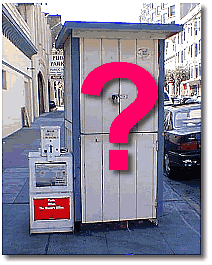

| Vendor's Story |
| By Liz Garone |
|
For 27 years now, Richard Brielh has been following the same routine, with only slight variations in hours and locations. Brielh breakfasts alone at "8 Bells" in his Polk Street apartment. "No wife or kids to worry about," says the 69-year-old Examiner newspaper vendor. He arrives at his stand at 10 a.m. and closes up around 5:30 p.m. He likes to take lunch at noon or a little after that. He times his day not by the clock perched above him on the wall, but by the mailman delivering and picking up the mail. "It's 2:45 p.m.," Brielh announces, as a U.S. Postal Service truck makes its way around double-parked cars, and pulls up to a nearby mailbox. But this routine could become extinct in the near future. Executives from Hearst, which owns the Examiner, announced on August 6 that the company would purchase the Chronicle for an undisclosed sum. Along with that announcement came one that could effect Brielh's livelihood: the Examiner is going on the auction block. If a suitable buyer isn't found soon, it's curtains for the Examiner, which would then merge with the Chronicle and adopt its rival's masthead. "God willing, I'll still have a job in 2000," says Brielh, who doesn't exhibit a strong allegiance to the Examiner. "But I don't know what's going to happen. No one does. They don't tell us anything." "We have quite a few vendors," says an Examiner street sales supervisor, unwilling to give his name. "They're there for the convenience of the customers. That's it. I don't know what's going to happen to them." Unlike Phil Bronstein, the paper's executive editor, Brielh doesn't have a Sharon Stone at home to help him ride the rough times. He just hopes he'll be able to stay on, even if the paper folds. "If they ask me to start selling Chronicles instead, I'll do it," says Brielh. "A paper's a paper, a job's a job. What's the difference?" What started in the early 70s as a part-time gig without benefits has grown into a six-day-a-week (off on Sunday), full-time vendor job for Brielh. "The years have snuck by so fast," he says. He wears a signature blue veterans uniform, charcoal gray beret and glasses as thick as Coke bottle. "I'm starting to feel my age." Brielh also looks his age. At 69, the Korean War veteran shuffles more than strides as he makes his way each day down bustling Polk Street to his small stand, the size and shape of a telephone booth. His hair and chin stubble are peppered gray. His breath is labored. Inside his booth at Polk at Sacramento are a clock and numerous military citations, including a Disabled American Veteran plaque. Brielh received a medical discharge from the military when he was 23. He took a variety of posts as a security guard before landing the vendor position. "I just fell into it," he explains. "A friend told me about it. As long as I show up everyday and sell 100 papers, they told me, I've got a job." Walking down Polk, it's easy to miss Brielh, his head often completely obscured by a fresh stack of Examiners. He lets the display of papers speak for itself. No shouting out the day's headlines for him. "Some fellows do that, but I don't," he says. "I don't believe in doing it that way." Ball game scores and classical music used to emanate from the newspaper stand. But not anymore. Not since Brielh's radio was stolen three times. "I turned around to get something, and just like that, it was gone," Brielh gestures with gnarled hands. "At $100 a pop over at Radio Shack, you can only replace them so many times." These days, Brielh contents himself with a book, maybe a historical novel, often times a war memoir. Brielh loves books. "I just eat 'em up," he says, in a whisper that belies his gruff, sea captain appearance. He takes pride in his vendor position. Customers are greeted with a courteous "Good Morning" or "Good Afternoon." He keeps the area around his booth clean, and the papers are always neatly stacked. For every 100 Brielh sells, he is paid $6.50 (six and one-half cents a paper). This is in addition to an "adequate" salary. By combining his salary, the commission he makes on papers, and his social security and disability checks, Brielh makes do. But if he were to lose his job, he isn't sure what will happen. "If I can't (work) I can't," he says, matter-of-factly. "I'll survive, but I'm gonna have to go heavily on a budget." The locals know him and like having him around. "The Examiner guy? Oh yeah. I see him every day," says one. "He must be as old as the paper." Well, not exactly. Next year The Examiner will celebrate 120 years of Hearst ownership. (William Randolph Hearst's father, George, won the paper as payment on a gambling debt in 1880.) Brielh will just be hitting 70 -- and, if all goes well, still gainfully employed. |